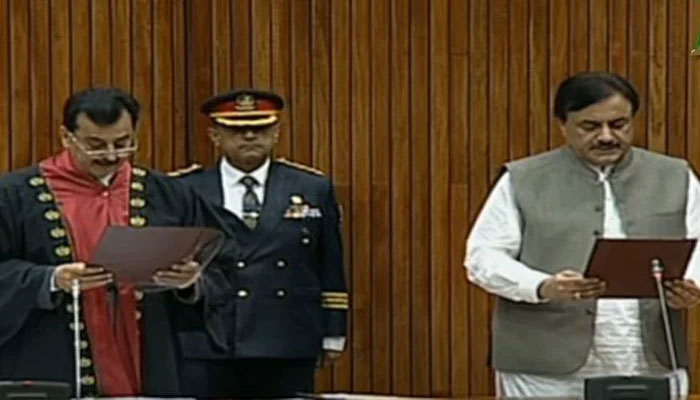Smooth sailing?
No other candidate submitted nomination papers against them for the top Senate posts
All the pieces of government seem to be coming together. On Tuesday, Syed Yusuf Raza Gilani from the PPP and Saidal Nasir Khan from the PML-N were elected unopposed as the Senate chairman and deputy chairman. No other candidate submitted nomination papers against them for the top Senate posts. But while the government may be coming together, it is certainly not without protest by the PTI which has called the Senate and chair and co-chair election illegal and demanded adjournment of the house till the election of senators from Khyber Pakhtunkhwa is completed. There has already been debate regarding this with some legal experts saying that the Senate is as yet incomplete and so the chair and co-chair election doesn’t stand. The government, however, is relying on Article 60: which it says provides for election for the posts of the Senate chairman and deputy chairman as soon as the key posts are vacated. One is at a loss to see how the elected chair and co-chair of the Senate can now be dislodged by the PTI – regardless of its protestations. What it can do is make a narrative in its favour, which its supporters can then lap up.
This power of the narrative may also be the main driving force behind recent speculations that PTI founder Imran Khan will be out of jail soon after Eid. From PTI leaders to journalists, this is a rumour that has gained speed in the past few weeks. Their reasoning? That the PTI’s popularity means that those that matter in our power equation have no choice but to talk to the party and make way for Imran’s release due to public pressure. And that the current government does not have any legitimacy due to the controversy surrounding the February 8 elections. The equally – or more – believable counter to this argument is that there is no indication that Imran Khan will get any relief. One, there are no issues between the government and the powers that be. This government is also part of the hybrid system so the government and establishment can only have a fallout if the government fails on the economic front. Two, there are very signs – none, really – that there has been any softening of the stance towards the perpetrators of the May 9 riots.
While it is difficult to predict what can happen in Pakistani politics since things change so quickly in real time, the government looks stable for now. It has a clear majority with its allies, the PML-N has a government in Punjab, the PPP has a government in Sindh and there is a coalition government in Balochistan. The two parties got their chairman and deputy chairman elected to the Senate quite smoothly and things are moving forward for the government and its allied parties. Nothing is ever certain in politics, though, and the PTI may want to reconsider its approach of not talking to other political parties. The way forward can only be together if the country’s political parties want to step outside the box the hybrid system has placed them in. Unfortunately, given Imran’s politics, it seems unlikely. Maybe the government should make the first move and open negotiations with the PTI. Let’s hope some sense prevails post-Eid.
-
 Katherine Schwarzenegger Shares Sweet Detail From Early Romance Days With Chris Pratt
Katherine Schwarzenegger Shares Sweet Detail From Early Romance Days With Chris Pratt -
 Jennifer Hudson Gets Candid About Kelly Clarkson Calling It Day From Her Show
Jennifer Hudson Gets Candid About Kelly Clarkson Calling It Day From Her Show -
 Princess Diana, Sarah Ferguson Intense Rivalry Laid Bare
Princess Diana, Sarah Ferguson Intense Rivalry Laid Bare -
 Shamed Andrew Was With Jeffrey Epstein Night Of Virginia Giuffre Assault
Shamed Andrew Was With Jeffrey Epstein Night Of Virginia Giuffre Assault -
 Shamed Andrew’s Finances Predicted As King ‘will Not Leave Him Alone’
Shamed Andrew’s Finances Predicted As King ‘will Not Leave Him Alone’ -
 Expert Reveals Sarah Ferguson’s Tendencies After Reckless Behavior Over Eugenie ‘comes Home To Roost’
Expert Reveals Sarah Ferguson’s Tendencies After Reckless Behavior Over Eugenie ‘comes Home To Roost’ -
 Bad Bunny Faces Major Rumour About Personal Life Ahead Of Super Bowl Performance
Bad Bunny Faces Major Rumour About Personal Life Ahead Of Super Bowl Performance -
 Sarah Ferguson’s Links To Jeffrey Epstein Get More Entangled As Expert Talks Of A Testimony Call
Sarah Ferguson’s Links To Jeffrey Epstein Get More Entangled As Expert Talks Of A Testimony Call -
 France Opens Probe Against Former Minister Lang After Epstein File Dump
France Opens Probe Against Former Minister Lang After Epstein File Dump -
 Last Part Of Lil Jon Statement On Son's Death Melts Hearts, Police Suggest Mental Health Issues
Last Part Of Lil Jon Statement On Son's Death Melts Hearts, Police Suggest Mental Health Issues -
 Leonardo DiCaprio's Girlfriend Vittoria Ceretti Given 'greatest Honor Of Her Life'
Leonardo DiCaprio's Girlfriend Vittoria Ceretti Given 'greatest Honor Of Her Life' -
 Beatrice, Eugenie’s Reaction Comes Out After Epstein Files Expose Their Personal Lives Even More
Beatrice, Eugenie’s Reaction Comes Out After Epstein Files Expose Their Personal Lives Even More -
 Will Smith Couldn't Make This Dog Part Of His Family: Here's Why
Will Smith Couldn't Make This Dog Part Of His Family: Here's Why -
 Kylie Jenner In Full Nesting Mode With Timothee Chalamet: ‘Pregnancy No Surprise Now’
Kylie Jenner In Full Nesting Mode With Timothee Chalamet: ‘Pregnancy No Surprise Now’ -
 Laura Dern Reflects On Being Rejected Due To Something She Can't Help
Laura Dern Reflects On Being Rejected Due To Something She Can't Help -
 HBO Axed Naomi Watts's 'Game Of Thrones' Sequel For This Reason
HBO Axed Naomi Watts's 'Game Of Thrones' Sequel For This Reason




